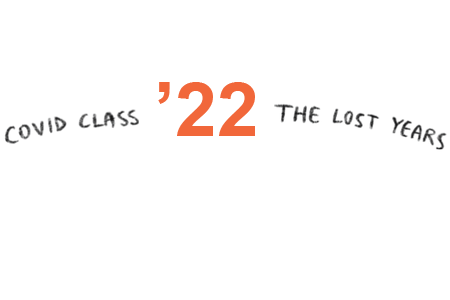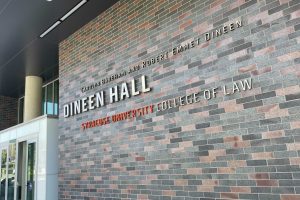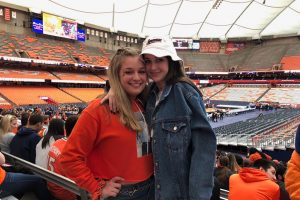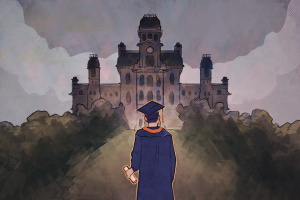Seniors consider post-grad plans after the pandemic
Seniors consider post-grad plans after the pandemic
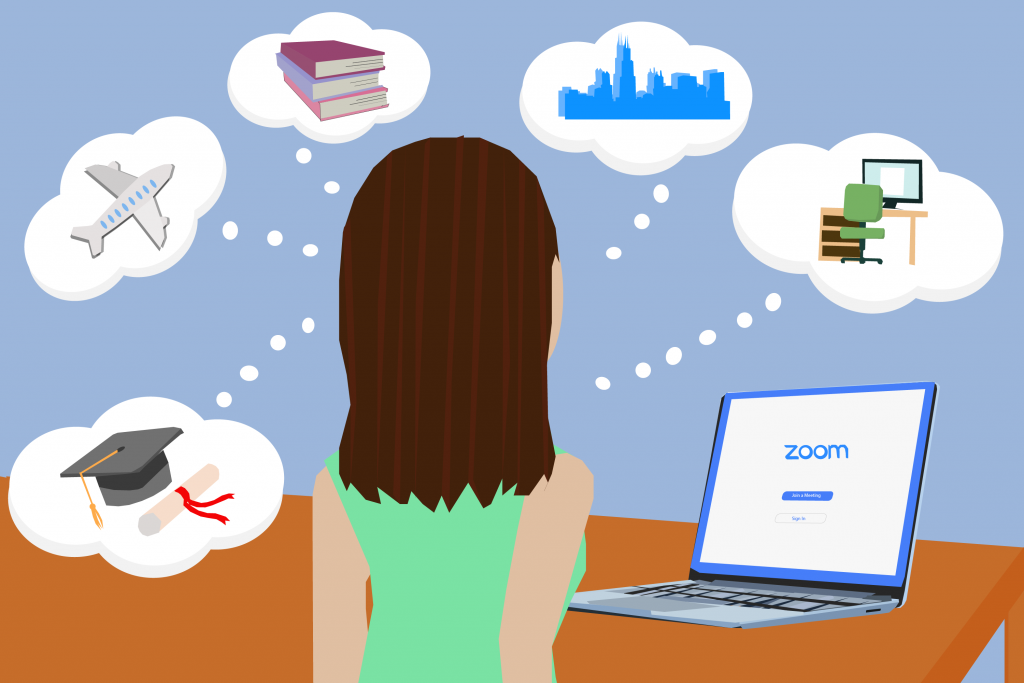
When the COVID-19 pandemic hit the United States, students in the class of 2022 were halfway through college in the second semester of their sophomore year.
The pandemic has impacted students as they sought to complete their remaining four semesters of college in this new virtual, hybrid and post-pandemic world. The changes brought on by COVID-19 have influenced seniors’ educational and professional experiences while at SU and beyond as they prepare to embark on their next journeys.
Adam Capozzi, director of career services, assessment & student success at SU, said despite the challenges brought on by the pandemic, students’ ability to successfully adapt to changing conditions allowed them to reap many of the benefits and experiences seen pre-COVID.
In order to best support students, Capozzi said over the past two years his office has shifted its focus beyond just career and professional advice. He said the pandemic has opened advisors’ and students’ eyes to consider more than just academic and professional interests when it comes to one’s career options.
“Our conversations with students have morphed not only into careers but talking about personal development, personal value, personal worth and figuring out where the balance is,” Capozzi said. “We’re kind of like pseudo-life coaches in a little bit of a way with the career being the underlying focus and theme.”
Through expanded virtual office hours to accommodate students across multiple time zones during remote learning, to increasing the office’s virtual summer workshops and providing “micro internships” for students to work on projects for board of trustees members, Capozzi said Career Services worked to support students and their professional endeavors.
Despite the expanded support and opportunities for students throughout COVID, Career Services recognized a skillset graduates may have missed out on: the professional experience that comes with going into an office every day and interacting with coworkers, face-to-face.
According to PEW Research, as of January 2022, 59% of Americans were working remotely from home “all or most of the time”, with 65% of such workers having a Bachelor’s Degree.
Without working in-person, 74% of recent graduates voice concerns they will miss the office community, and 41% say they will miss out on mentoring opportunities, according to a recent poll from Generation Lab.
Capozzi agreed with these concerns — he said by not going into the office, young people miss out on formative experiences which develop “soft skills” such as professionalism, etiquette and work social skills, which cannot be replicated in a virtual capacity.
“It’s like a song and dance, and if you don’t have the opportunity to see that firsthand or participate in it, it can be very daunting going into a workplace … there’s gonna be some lulls when you’re like ‘OK, do I participate, do I be a wallflower, do I follow up individually with a person in an email’, you never know,” Capozzi said.
Even with this potential lapse in skills, Capozzi said he is confident in students in the class of 2022’s ability to enter their future endeavors, whatever that may be, with the breadth of knowledge and opportunities provided to them at SU.
“As an institution, I would say the university has done best what it was able to do to allow for that personal trajectory to build with the educational trajectory…,” Capozzi said. “When you think of it in the microcosm of a four-year university, a lot of you were still able to take on things. Did it look different? 100%, but there’s still so many avenues for exploration.”
The international teacher

Senior creative advertising major and French minor Emily Bright had dreamed about living in France and reconnecting with her family there since she was a little girl.
In high school, Bright traveled to France in high school for a trip which reaffirmed her love for the French language and culture, however after her study abroad program was canceled during her junior year due to COVID-19 restrictions, she began to rethink things.
“I always thought of it in terms of ‘I do so much work for my major here and I work hard and I do all these things,’ and advertising, in this sense, can wait for a year,” Bright said. “I talked to my professors about it, and it’s tough for people who are maybe going and getting jobs and moving to a city and starting their lives, but I always wanted something really different.”
This fall, Bright will be moving to Strasbourg, France for a year to teach English at the University of Strasbourg through SU’s abroad partnership with the University. Through her work, Bright will plan lessons, prepare presentations, and spend about 15-20 hours in the classroom each week.
Because she will only be working part time, Bright said she is excited to have the opportunity to really explore the city of Strasbourg — its history, culture, food, art, and culture — as well as that of surrounding cities in France and beyond.
Although her decision may seem unconventional to some, Bright said after the past two years and the stagnancy she has felt from the pandemic, she needed a change.
“I really just feel like an adventure is needed,” Bright said. “I feel very stationary… this semester maybe not as much, but last year was very stationary in my life where I was like nothing is revolving, nothing is moving it’s very static. This is completely shattering and disrupting everything I have built up here in a way,” Bright said.
While she is excited for this new chapter in her life, Bright said she also has experienced anxiety about graduation approaching and the reality that she will be apart, halfway around the world from her family, friends and the community she has built over the past four years in Syracuse.
“One way that I have been coping with that [anxiety] is knowing that I am going to have another school experience in the future,” Bright said. “I know these bittersweet emotions I am feeling now will help me to be able to be a student [this time] in a way from a different perspective as a teacher.”
Bright said she also finds solace in knowing that her experiences abroad will help her professionally when she returns to the states. She said she has always had an interest in international advertising, and through immersing herself in French culture, she will be able to see things from a new perspective.
“As a copywriter they tell us to think outside of the box all the time, but that’s virtually impossible,” Bright said. “You need to live somewhere else to be able to break out of your mind and those barriers and think differently.”
The corporate consultant

Steve Sfikas, a senior information management technology major and visual culture minor, said for his area of study, making the switch to remote and hybrid learning during the pandemic was not as challenging as some of his peers.
“Everything I needed to do I was able to do somehow on my computer,” Sfikas said. Whether it be labs with remote desktop, data visualization using excel, or using programs such as Adobe Illustrator, Sfikas said he was able to adapt his course and lab work as the conditions of the pandemic evolved.
With the flexibility of remote learning, Sfikas said he focused his efforts on securing internships for the summers of 2020 and 2021 — because most work opportunities were remote, positions were more competitive as people from all across the country could apply regardless of where they were located, thus causing more pressure, he said.
After months of networking with alumni and meeting with career advisors at the iSchool during his junior year, Sfikas landed an in-person summer data analytics internship at Advan Research Corporation, a tech startup in New York City.
Sfikas said he is grateful for his experience and being able to work fully in-person. Although a lot of his work was done at his desk at a computer — analyzing data and spreadsheets — Sfikas said going into the city every day helped him decide what he wants to do and where he wants to be post-graduation.
“[My internship] reaffirmed things that I already expected going in,” Sfikas said. “I’ve always wanted to live in New York City, so being able to go on the train and kind of see what it was like to walk around the city during a workday was cool for me. Not necessary, but albeit helped with my decision.”
After graduation, Sfikas will be starting as a full time technology consultant at Ernest Young’s New York City office. He said it is unclear if he will be working in-person, remote, or hybrid, something which at first caused him stress and anxiety.
“… I know a lot of people that did internships from home and now they already know what to expect with full time remote work moving forward,” Sfikas said. “I just got a full time job and I’m not sure what it would be like to do hybrid there or work online there whereas other people have already done that already.”
Despite this shift, Sfikas said he is excited for the opportunity and beginning his first job post-grad. The prospect of working from home, while initially daunting, may be a positive as it will allow some extra time to find roommates and an apartment in the city, according to Sfikas.
The graduate student

In her final semester at SU, senior international relations and citizenship and civic engagement major and anthropology minor Emma Culver made the decision to apply to graduate school to receive her Masters in Public Administration (MPA) at her alma mater.
According to Culver, getting her Masters was never part of her plan, in fact, she said she was against going back for more schooling. However as graduation approached, Culver said she did not feel prepared to enter the workforce given her unfamiliarity with the job application process and her previous internship experiences.
“Just in general, everything just felt like I didn’t really know what was going on and I was like ‘Okay, I’ll do my Masters I guess,’” Culver said.
In her area of study, Culver said it is very challenging to land a competitive, well-paying job with just a Bachelor’s degree. She added that through the University’s Forever Orange Scholarship for undergraduate students staying for graduate school, it made the most sense professionally and financially.
“With just the Bachelor’s degree, I think because the [job] market is so saturated, I felt like I kind of needed that little edge.”
Throughout the pandemic, Culver said she valued the prospect of remote learning because it allowed her to manage her time on her own. She said during her junior year she was able to work a total of four internships both at the University and in the surrounding community, while managing her full course load.
“I’m very fortunate to have had a positive pandemic experience,” Culver said. “It’s kind of sad to me because mine was so beneficial actually for my mental health. I was able to slow down [socially] but speed up [professionally and academically].”
Given this, Culver said she is still determining how she will complete her Masters degree — she said there is an option to take classes fully remote, and the possibility to extend her one year of studies to 18 months and take on an internship.
As she grapples with the emotions associated with graduation and the next coming months, where she will be and what she will be doing, Culver said she knows she is doing the right thing by continuing her studies at SU and the Maxwell School.
“I’ve been trying to avoid thinking about it just because it’s scary to think about, graduating undergrad, and then it’s like ‘Okay, you’re still in school but it’s more like you’re on your own type of thing’”, Culver said. “It’s a lot of emotions. I’m nervous but I’m definitely also excited. I feel like this is the right thing for me to do right now, but that doesn’t make it easy.”

